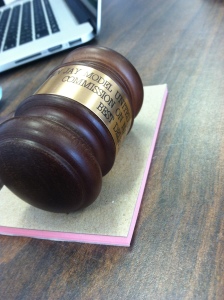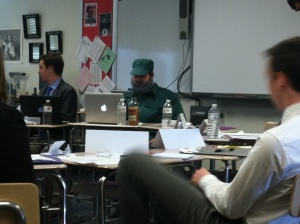On Saturday, November 15, 2014, John Jay High School in Cross River, NY hosted their very own, first-ever Model UN Conference. After months of hard work, their club was able to accomplish its biggest feat yet: a conference with seven committees, almost 200 delegates, and eight schools from New York, New Jersey, and Massachusetts in attendance. The conference consisted of six committees including the World Health Organization, General Assembly Ad-Hoc Committee on Security Council Reform, Commission on Narcotic Drugs, NFL Owners’ Meeting, and two crisis committees on WWII prevention and the Cold War.
The time and effort that is necessary to host a Model United Nations on any scale is incredible. The logistics, the training, the research, and various other details can take almost a year, and it all comes down to one weekend to make a memorable, engaging conference.
John Jay High School Model United Nations was up to this challenge. They have been developing their club for years and are currently one of the largest clubs in their school with over sixty members. Their club is one of the few high school Model UN clubs in Westchester county and upstate New York. Following years of attending conferences, the members of John Jay Model UN wanted something more. They started to develop the idea of hosting their own conference.
“We had already attended conferences, both local and in other states. We were looking for another challenge,” said Jeffrey Steckler, Secretary-General of JJMUNC 2014.
What the members of John Jay Model UN wanted to see was a conference unlike the ones that they had attended in the past. The key difference was through the delegate approach they used. They wanted to make a conference that they would want to attend themselves. The idea of a conference run by high school students for high school students started to take shape and developed into a well-organized assembly of John Jay’s brightest who were in charge of all the important aspects needed to make a successful Model UN conference.
The JJMUNC Secretariat stressed the importance of training for their conference staffers. Senior member Liam Hafter was in charge of making sure every dais was properly trained in procedure and engaging delegates in order to have sophisticated and entertaining debate. Liam made sure staffers knew what to do when there was a lull in the committee or an unruly delegate. While Mr. Hafter did this, Sophomore member Daniel Gordon worked with the new delegates of John Jay to train them on procedure and prepare them for the conference. It was important for the new delegates to know the rules as well for the future of the club and for conferences to come. The Secretariat also highlighted the importance of making sure that the delegates were enjoying themselves. The delight was evident while entering the committee rooms, whether it was during debate, writing papers, or the very theatrical, interactive crisis updates that made committee rooms roar with hilarity and amused frustration.
JJMUNC’s focus on training and entertaining the delegates, while also having formative debate, stands as a testament to what all conferences should do. JJMUNC’s dais was well-trained and adaptable in response to any situation that occurred in committee sessions. JJMUNC’s crisis staff had very innovative ideas including one dais member dressed as Fidel Castro in the Soviet Union crisis committee as well as live BBC news reports and question-and-answer periods from German henchmen.
The success of JJMUNC I was evident in the enthusiasm each staff member and delegate had for those they met and for the time shared working together for the benefit of their committees. When JJMUNC I was over, the staff members had only one thing left to discuss: When will we have JJMUNC II?
Tips for Hosting a Model UN Conference
While attending JJMUNC, my focus was to get advice from students on how to host a conference. Since the students at John Jay High School were working on hosting their first conference ever, I felt that they gave excellent perspective on how to make your first conference run smoothly. The following are tips and things to keep in mind when going through each stage of the conference preparation process:
The Planning Stage:
- Discuss with your club what goals you wish you accomplish at your conference.
- Think of any themes you wish to address throughout the conference.
- Assign jobs and positions for people to manage.
- Make sure you have the necessary budget to make the conference possible, and if not, fundraise!
- Create a list of the necessary supplies you will need for conference preparation.
- Create a timeline for when things are projected to be done in order to make sure you have everything necessary up to the conference date.
- Actively communicate with your staff and advisor!
Preparation Stage Part I:
- Make sure you have set committees and dais staff who are going to write the background guides for the conference.
- If you have crisis committees, make sure the crisis staff designs how they wish the committee to go and options for potential alternative scenarios.
- Have someone designated to train the dais members on procedure. Make sure people know procedure and how to engage delegates by making the committee fun, yet professional.
- Coordinate with your advisor for the catering options for lunch and dinner.
- Have a draft of the conference date schedule that includes when registration, opening ceremonies, meals, and committee sessions start and end.
- Create a Letter of Invitation and invite schools to come to your conference.
- Make sure deadlines are met!
Preparation Stage Part II:
- Have your background guides ready for editing. Finalize these and publish them for your delegates.
- Have dais training sessions.
- Keep up with correspondence from schools and document checks once schools begin to register.
- Discuss with your advisor and meet with your school administration in order to secure the classrooms for the conferences. Also inform them of any supplies you need such as podiums, microphones, projectors, etc.
Pre-Conference:
- Print out multiple registration sheets for first day registration.
- Create a matrix for what countries are in each committee and which schools are in order to disperse them out evenly.
- Work on making folders for your conference and include the schedule, background guide, and any other necessary information.
- Make a template for awards so you can easily insert the name of the delegates prior to closing ceremonies.
- Do final training for dais members and conference and crisis staff.
- Confirm with caterers the time they will be arriving and the quantity of food you ordered at least three weeks before the conference and then the week leading up to the conference in case numbers change.
- Make sure you have confirmed the delegation size of each school.
- Coordinate with your advisor and administration on medical and legal issues. Also, confirm the needed supplies and room assignments for the conference date.
- Keep communication open among all members and the advisor about all aspects of the conference so no one is left out of the discussion!
- Finally, relax and wait until conference begins for the real fun!



